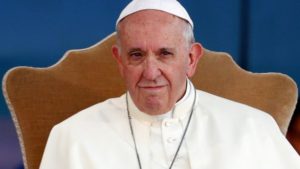 I have kept a promise to my readers not to speak of the ever-absorbing topic of American politics for over six months. But it remains difficult not to comment when a large swathe of Christians in the States continues to support the most immoral and disconnected from the truth president that that country has ever seen. Without rehearsing all his immoral activities which include assaulting women and a chronic lack of feeling for his fellow human beings, Donald J. Trump represents everything that a Christian might want to shy away from. If Christian parents really cared about the moral formation of their children, they might want to forbid any discussion of his activities in the home. The apparent normalisation by Trump of lying and his ability to make up a truth to suit an audience, is corrupting to everyone in America today.
I have kept a promise to my readers not to speak of the ever-absorbing topic of American politics for over six months. But it remains difficult not to comment when a large swathe of Christians in the States continues to support the most immoral and disconnected from the truth president that that country has ever seen. Without rehearsing all his immoral activities which include assaulting women and a chronic lack of feeling for his fellow human beings, Donald J. Trump represents everything that a Christian might want to shy away from. If Christian parents really cared about the moral formation of their children, they might want to forbid any discussion of his activities in the home. The apparent normalisation by Trump of lying and his ability to make up a truth to suit an audience, is corrupting to everyone in America today.
And yet the support of the president by good Christian people continues strong. How can we account for it? The reasons for the support of Trump by around 80% of white evangelicals will no doubt be the subject of PhDs and learned books in the future. What I can say in a short blog post will only touch on a few of the issues. My comments mainly refer to the unique American context which evangelicals occupy in the States and so my observations do not normally apply to evangelicals in the UK.
When the American republic was founded some 230 years ago it was not just a military uprising by a colonial outpost of the British empire. It was also an attempt to rewrite the way politics itself might be conducted. The American ideal was to do politics in accordance with the new ideals of the Enlightenment. No longer would the tasks of government be entrusted to existing elites and privileged groups as they were in Britain. The revolutionary state would also no longer base its guiding principles on religious ideas handed down from the past. The American Constitution speaks about truths being ‘self-evident’. There was an attempt to suggest that their way of ruling was based on the exercise of reason without any of the baggage of the past. A similar veneration for the power of human reason was carried over into the French Revolution which occurred only a few years later.
Behind this arrival of self-evident truth into American political thinking was a movement among intellectuals known as ‘common-sense’ philosophy. This movement, which originated in Scotland, stated that the evidence of the senses can be trusted. Ordinary human beings, even those who had not received a formal education, can grasp reality by the application of the ordinary exercise of reason assisted by the senses.
Although the role of religion in the American Constitution has been much argued about, it seems clear that the Founding Fathers hoped to keep politics and religion firmly separate. They thus refused to give any denominational expression of religion privileged status, no doubt hoping that religious belief would play little part in the development of the political life of the new nation. This hope as we see today has been thwarted and we have in the States a political system now more entangled with Christian ideas than anywhere else in the Western world.
‘Common-sense’ ideas were not just followed in the politics of the new state. They also spilled out to the population at large. The philosophy gave to ordinary people the sense that they could have an opinion in everything, including religion. There was effectively a rediscovery of the Protestant principle that everyone who possessed a Bible could find their individual path to God. The application of ‘common-sense’ allowed the massive expansion of evangelical churches in the 19th and 20th centuries. No one questioned the strangeness of thousands of new churches appearing, each of which were claiming to have a unique and final understanding of Scripture and thus of God. Common-sense ideas have always been dismissive of notion of tradition and the possibility of denominational authority.
Most Evangelical churches in America continue firmly in this common-sense tradition. The particular way in which the common-sense approach is applied is in the understanding of Scripture. If the Bible says that the world was created in six days then common-sense tells us that this has to be literally true. Theories like evolution, higher criticism and textual analysis all emerge from an expertise that even now is considered belonging to a despised educated elite. Elitist traditions were all rejected by the Revolution. In short, the American revolutionary impulse lives on in the fundamentalist chapels of America. Any knowledge that critiques the ‘plain’ understanding of Scripture is firmly rejected.
The tidal wave that carried Trump into the White House drew on the nativist American traditions of anti-elitism and anti-establishment. One might even claim that some of the energy for Trumpism can be traced right back to the American Revolution itself against the rule of King George. Even if we do not go back that far, we can still see a huge reservoir of what we might describe as a primal resentment against a privileged ‘them’, those who through education and wealth control the levers of power. We should not be surprised that fundamentalist churches in the States should have provided shelter and support for these political forces of reaction and conservatism.
Speaking from the perspective of someone who deplores the effects of fundamentalist rhetoric and thinking, it is hard to see how this tense stand-off between the educated elites in the States and those who reject and resent them for their power can be reconciled. From my point of view, it requires education to teach people the principles of critical thinking, the awareness of paradox and the ability to hold two opposing points of view simultaneously. These abilities to reason in a ‘liberal’ way stand over against huge numbers of people who believe that truth can always be grasped by the simple application of gut reason. There are always going to be problems. The evangelical churches have largely identified with the anti-liberal masses and they see Trump as reflecting their ways of reasoning. It is a highly risky strategy. Moths are attracted to a flame, and so conservatives who are attracted to Trump run the risk of being burnt up. The realisation will eventually dawn on his supporters that so far from supporting favoured conservative causes, Trump has led them to a place of intellectual and moral emptiness. The old common-sense ideas of the 18th century made sense to a new nation struggling to overcome the legacies of elitist thinking and the philosophies of the wealthy and privileged. They make little sense in the present century. The insights of science, culture and advanced technology are all needed if America, or any other country, is to make its way in the world. Without modern insights, technical and philosophical, there is only deprivation and widespread poverty. The regression to ‘primitive’ ways of thinking which Trump is encouraging in church and politics is bad news for that country and bad news for the world. When American history is written, the word ‘evangelical’ will probably be a word of abuse. Many will regard all who followed this religious movement under Trump as being on the wrong side of history and certainly on the wrong side of the history of the Christian Church.





